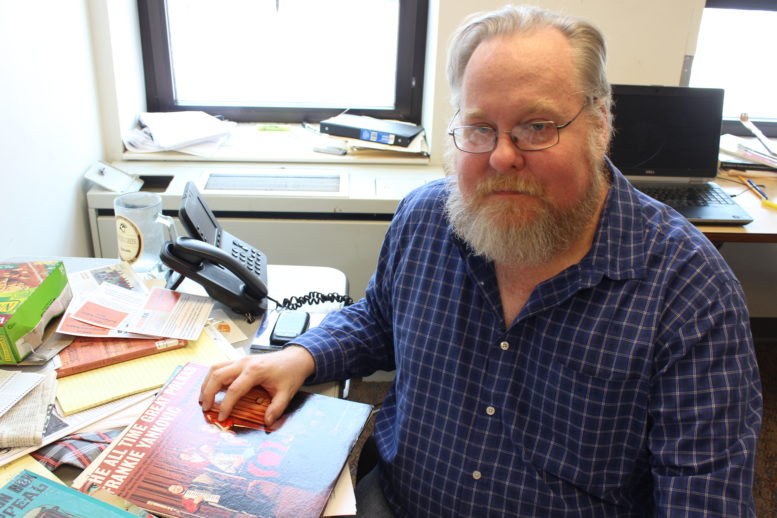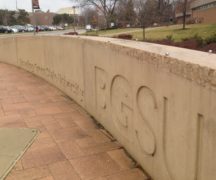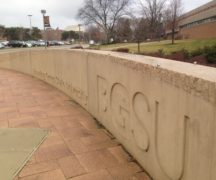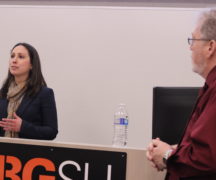By DAVID DUPONT
BG Independent News
David Jackson, president of the BGSU Faculty Association, said the union is still trying to figure out the ramifications of the Supreme Court’s decision Wednesday forbidding public sector unions from charging non-members fees to cover services.
The court rules 5-4 in Janus v. AFSCME Council 31 that non-members cannot be forced to pay “fair share “ or “agency” fees to cover the costs of a public sector union negotiating contracts and representing individual employees in disputes with the employer.
The decision, which Jackson characterized as “rotted, reprehensible, illogical,” was “not a surprise.”
Jackson, who teaches political science, was speaking in his role as faculty association president, not as an unbiased analyst.
“We knew five corporate justices on the court were inclined to accept this completely bogus argument and side with wealthy special interests. That’s what they’re there for. That’s why the seat was stolen in the first place.”
Jackson was referring to Republican senators’ refusal to act on President Barack Obama’s nomination of Judge Merrick Garland to fill the vacancy created by the death of Justice Antonin Scalia. Instead the GOP left it up President Donald Trump to fill the vacancy with Neil Gorsuch, who sided with the majority in the Janus case.
The lead plaintiff, Illinois state employee Mark Janus, said that the fee was a violation of his First Amendment rights because it forced him to support speech he didn’t agree with.
While the decision is complicated, it’s clear the faculty association cannot collect fees from non-members. Still, Jackson said, “the good work we do problem solving and representing faculty will continue.”
He said the association’s attorneys are still trying “to digest the decision and figure out all the different meanings of it.”
The decision written by Justice Samuel Alito possibly left open the option of charging non-members if the union represents them in personnel disputes, Jackson said.
State law, Jackson said, requires the union represent all members of the bargaining unit, not just union members. They in turn could charge a fair share fee “to account for the cost of negotiating, interpreting and enforcing the terms of the contract” as well as representing them in disciplinary procedures.
Jackson declined to give specific numbers, but said an “overwhelming majority of faculty” are members of the BGSU-FA.
The faculty voted to unionize in fall, 2010, and reached its first contract three years later after contentious negotiations. Negotiations for the union’s third contract will begin in fall. Unlike the first contract talks, the negotiations for the second contract were described by both sides as amicable.
Jackson believes the collective bargaining agreement has benefited the institution as a whole. “Collective bargaining is the best thing that’s come to the university in a long time.
“It’s brought us consistency and certainty and predictability in terms of the budget and in terms of policies. Policies are more fairly implemented. Faculty have a representative when accused of wrongdoing.”
That doesn’t mean faculty are always cleared. It’s that “an elementary concept of due process is protected in ways they haven’t been before.
“It’s easier to be an administrator if you have clear policies that apply to everyone. … It’s removed a lot of doubt and mystery.”
The announcement later Wednesday of Justice Anthony Kennedy, who voted with the majority on Janus, was a further blow. Kennedy is generally viewed as a swing vote on the court. Jackson, again speaking as an activist not analyst, said he expects Trump to appoint someone in the mold of Gorsuch “who is not a friend of working people”
The only options for progressives “is to have a Senate that can block the most potentially reprehensible nominee he puts up” and instead find “someone consensus can be built around.”
Despite all this “The sky is not falling,” Jackson said. Polling shows unions popularly is increasing and young people are beginning to realize unions are something that can make their work lives easier.”
Faculty “are recognizing we are working people who need the protection of collective bargaining and workplace democracy. There’s no more important place to have democracy than in the place you spend half your waking hours.”





